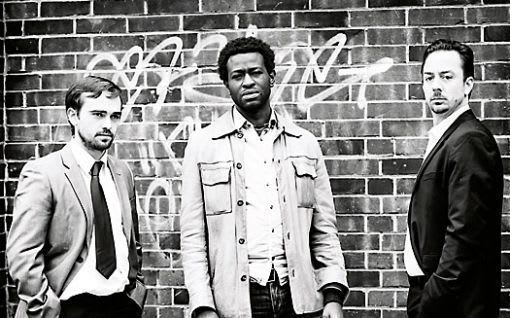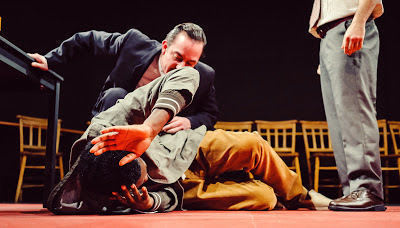The Sus Law, used to justify persistent stop and search by police officers In the 1970s and early 1980s, dated back to 1824 legislation that made intention to commit a crime itself a crime enabling the arrest of anyone in a public place who came under police suspicion if there were two witnesses. Most frequently it was black men who were stopped and this fuelled racial tension and led to accusations of racism in the police force.
In Keefe’s 1979 play, unemployed black guy Delroy has spent the evening in a pub, leaving his pregnant wife at home, when he is hauled in by the cops. He thinks it is just another case of Sus being used. He’s been harassed before when they’ve searched him for drugs or police have thought they might pin some other crime on him. He knows he’s clean so hides his annoyance and goes along with them in “friendly” banter.
What they hold back from telling him is that they suspect him of a murder, and think they have circumstantial evidence that points that way. When the vindictive detectives do tell him they only gradually reveal that the victims are his wife and unborn child.
It is a gruelling and passionately felt play that is made even more pointed by the fact that it takes place on the night of Margaret Thatcher’s election victory in 1979; the policeman are gloating over the increasing Tory majority and Thatcher’s promise that their pay will go up by 40% plus expectations of a new, much harsher police regime.
With a strip of red vinyl flooring and some white paint on two walls, designer Celestine Healy has transformed this black box theatre into a stark interview room and places a row of chairs on its far side so that it is played on a traverse with only one entrance, the same door the audience uses.
Director Paul Tomlinson shows the same concentrated, pared-down approach; this is watching the action through a magnifying glass and it is very powerful. The cast of three give performances that stand up to it.
Karn, the senior of the detectives, and his assistant Wilby are forcefully played by Alexander Neal and Nason Crone (the founders of Dilate Theatre). They make them a seedy pair of little men, viciously wielding their authority first with verbal and then with physical assault, their racism increasingly apparent. Their belief that Delroy is guilty and their assumption of his motives cannot in any way excuse such sadism.
As Delroy, Wole Sawyerr gives a stunning performance. From the bravado of his initial pseudo-amused response to the policeman’s banter we see his confident, baffled, frightened, unbelieving and grief stricken. It is a role that is a gift to a talented actor but one that demands the utmost sincerity—and it gets it.
This is a passionate piece of high quality theatre that is as relevant today as when it was first stage over thirty years ago, six weeks into Margaret Thatcher’s first term in office as PM. Gut-wrenching to watch, it is given with a disturbing coda in a projected reminder on the screen where earlier there was an introductory explanation of Sus and a montage of images of Thatcher campaigning.
The Sus law was repealed in 1984, the result of exposure of police abuse and the riots of 1980-1 but new legislation in 1994 and the Terrorism Act of 2000 again gave the police the ability to stop and search members of the public even without suspicion.

